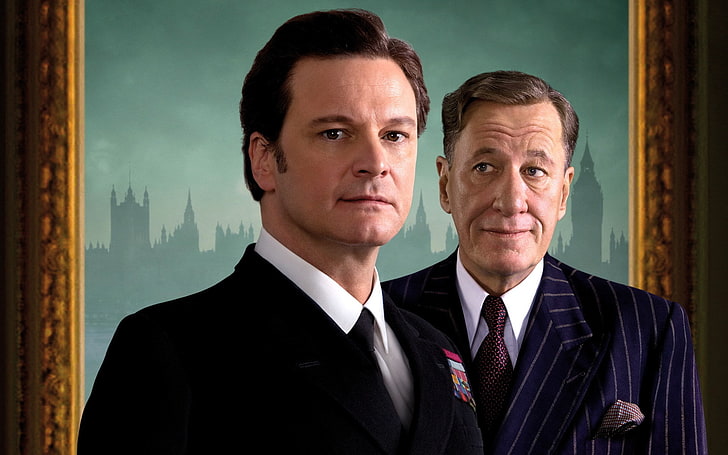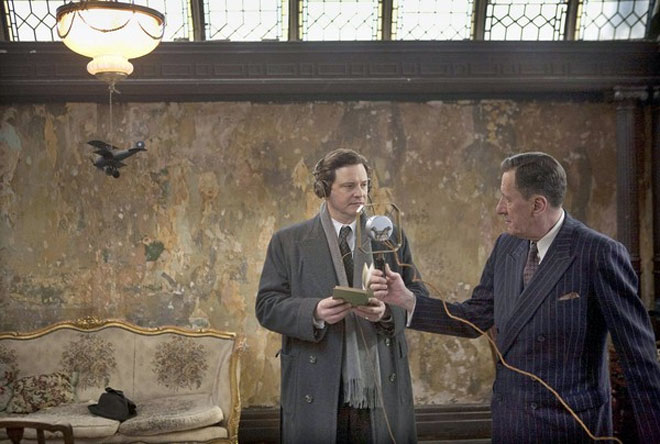The King’s Speech (2010)

DIRECTOR: Tom Hooper
CAST: Colin Firth, Geoffrey Rush, Helena Bonham Carter, Guy Pearce, Jennifer Ehle, Michael Gambon, Derek Jacobi, Timothy Spall, Claire Bloom
REVIEW:
The King’s Speech from director Tom Hooper and screenwriter David Seidler is proof that the “buddy movie” formula can be applied to things other than cop comedy-dramas, even to a historical docudrama about a decidedly odd couple friendship between King George VI and his speech therapist. To that end, it’s a handsome, stately period historical drama bolstered by strong acting and strong chemistry and the dynamic between two very different men who under different circumstances would never have met.
Ironically considering its title, The King’s Speech begins with a man who can barely talk and never wanted to be a king. King George VI (Colin Firth) is eventually Britain’s monarch through WWII (and the father of the current sovereign, Queen Elizabeth II), but when we first meet him he is merely Prince Albert the Duke of York, nicknamed “Bertie”. As the second son of King George V (Michael Gambon), Bertie neither wants nor expects to ever sit on the throne because he is behind his older brother Prince Edward (Guy Pearce) in the line of succession. A quiet life away from the 24/7 attention and pressures of Buckingham Palace and the reins of government suits Bertie and his wife Elizabeth (Helena Bonham Carter), especially considering that Bertie wrestles with a severe stutter that makes speaking, especially under pressure in public, difficult (illustrated when he makes a humiliating attempt to address a crowd at Wembley Stadium). Elizabeth seeks the help of Lionel Logue (Geoffrey Rush), an Australian speech therapist and failed actor who comes with unconventional methods and an unconventional attitude. In tried-and-true “buddy movie” (of sorts) formula, Bertie and Logue get off to a rocky start, but eventually their efforts begin to pay off. And Logue’s importance to Bertie increases when events conspire to shove Bertie onto a throne he never wanted, when his brother’s affair with American divorcee Wallis Simpson (Eve Best) leads to an abdication crisis, and Bertie suddenly finds himself thrust onto the throne of a British Empire facing encroaching war against Hitler’s Nazi Germany and, possibly even more intimidatingly, facing down a dreaded microphone to deliver a speech to a public seeking reassurance from a new King who’s not sure if he can give it.

Some historians have criticized the film for taking a measure of dramatic license; as is often the case, the timeline is a little fudged (Bertie actually first sought Logue’s help about a decade earlier than the film suggests, though the speech lessons leading up to his big speech as King lends things a sort of “race against the clock” narrative drive), and some elements have been overdramatized or otherwise tweaked (the movie glosses over the fact that Bertie and Winston Churchill at least initially did not see eye-to-eye, partly because Churchill had supported Edward over Bertie during the abdication crisis). None of these minor issues of dramatic license impact the film’s effectiveness however, or hinder The King’s Speech from working on multiple levels as a stately historical drama, an inspiring true story and role model for those struggling with similar speech impediments, or a buddy movie (of sorts). While at first glance it might be hard to see a prince and eventual king as an “underdog”, Bertie’s speech impediment gives him a relatable vulnerability to overcome that allows The King’s Speech, despite its protagonist’s privilege, to work as an underdog success story. Period details and costuming are impeccable, complimented by the classical strains of the score, although director Tom Hooper is overly fond of tilted camera angles, close-ups, and head-on shots with actors staring directly into the camera while addressing one another. The movie doesn’t invent any villain for manufactured extra drama (unless one counts the minor examples of Hitler, who only appears fleetingly in a newsreel and is a distant offscreen enemy, or Guy Pearce’s Edward VIII, who is portrayed largely unflatteringly but doesn’t really qualify as a “villain”), making the conflict here more about the main character’s internal and interpersonal struggles rather than about something as tangible as defeating a “bad guy”. The most implacable adversary Bertie must face is his own stammer. In fact, the microphone is filmed in both the opening and closing scenes in extreme close-up that makes it appear to be looming ominously as Bertie marches grimly toward it as if being taken to the guillotine.
The most intriguing aspect of the movie is the dynamic between Bertie and Logue, and the majority of its most involving and dramatically effective moments involve these two. The prince and future king and the shabby Australian (who lives in a modest flat with his wife and children that’s not the kind of environment Bertie is accustomed to) make a decidedly odd couple. Logue is blunt and plain-speaking, unimpressed with royalty and leaving the prince taken aback when he insists they be on a first-name basis, but we catch glimpses of the way he uses bravado—actor training?—to cover his uncertainty at how to approach such a prestigious client, and as Bertie makes progress and their relationship grows closer, we see the softer, gentler man with compassion and pride for a client who’s become his friend. For his part, despite grappling with his own feelings of inadequacy and unworthiness, Bertie is not devoid of royal snobbery; he has bursts of explosive temper when frustrated both by Logue’s unconventional methods and his impudence, and is affronted and indignant at the overly casual and familiar ways in which Logue speaks to and addresses him. However, as time goes by, he progresses from initial skepticism, to breaking his own rule about being strictly business and discussing no personal matters as Logue becomes not merely a speech therapist but also a confidant and adviser, to relying increasingly heavily on him and keeping him by his side during his public addresses. He shocks the prim and proper Archbishop Lang (Derek Jacobi) when he demands to have Logue in his private box alongside his family during his coronation ceremony (the movie does not gloss over the various instances of passive-aggressive snobbery Logue encounters both for being a commoner and for being Australian).
While The King’s Speech is primarily a serious historical drama, it is not entirely stuffy. There is some low-key comedy in some of Logue’s eccentric therapy lessons; there’s amusement to be had in the sight of Geoffrey Rush and Colin Firth looking stoically serious while jumping up and down, gargling, flailing their arms, and rolling around on the floor, as well as a moment when Logue’s wife (Jennifer Ehle) is shocked to come home and find the Duchess of York sitting at her modest dinner table. There’s also a scene which accounts for the vast majority of the movie’s profanity, in which Logue goads Bertie into spewing profanity after noting that he doesn’t stammer when he swears (incidentally, while there’s no sex or violence and the movie is otherwise mostly tame, the amount of profanity in this scene almost singlehandedly accounts for its R rating, which overall feels a little unwarranted). At the same time, there are also several moving dramatic moments of one-on-one character interplay, such as when a newly-coronated Bertie has a private breakdown to a comforting Elizabeth, and a drunken conversation where Bertie and Logue bond over model airplanes and Logue prods Bertie into opening up about his loveless childhood (when asked which family member he was closest to, Bertie makes the poignant admission: “the nanny”).

The individual performances and perhaps especially the chemistry of Colin Firth and Geoffrey Rush is the crux of the film, with Firth projecting the anguish and feelings of inadequacy behind Bertie’s stoic stiff upper lip demeanor, and Rush providing the perfect contrast as the flamboyant, self-assured Logue (he’s a long way from the grim Inspector Javert he played to memorable effect in 1998’s Les Miserables). Helena Bonham Carter tones herself far down from Harry Potter‘s gleefully wicked Bellatrix Lestrange, playing Elizabeth (eventually the “Queen Mother” to Queen Elizabeth II) as sharp-witted and sharp-tongued but tenderly supportive and fiercely protective of her husband. Apart from Firth, Rush, and Carter, no one else has a great deal of screentime, but smaller supporting roles include Guy Pearce as Edward VIII, who is portrayed unflatteringly as frivolous, superficially charming, and self-absorbed, Michael Gambon putting his booming vocal tones to good effect as their stern, demanding father King George V, and Derek Jacobi as the fussy, proper Archbishop Lang (Jacobi once played another famous stutterer as the titular Roman Emperor on the television series I, Claudius). Jennifer Ehle’s role as Logue’s wife allows her to reunite with Colin Firth, the first time they’ve shared the screen since co-starring in 1995’s television miniseries Pride & Prejudice (widely considered a definitive adaptation). If there’s one misstep, it’s Winston Churchill, who is both inaccurately-portrayed (depicted as supportive of Edward’s abdication when in reality he was one of his most prominent defenders) and arguably miscast; while Timothy Spall does an adequate job imitating Churchill’s distinctive voice, it’s hard to get Harry Potter‘s Wormtail out of one’s head (his fellow Harry Potter cast members onhand here manage to avoid this problem; Helena Bonham Carter looks and acts nothing like Bellatrix Lestrange, and Michael Gambon doesn’t remind us of Dumbledore except in his distinctive voice). In fact, given Churchill was peripherally involved at best in the events depicted onscreen, he feels a little shoehorned into a movie he didn’t really need to be in; fortunately he only has a few minor scenes and isn’t a major distraction.
The King’s Speech won’t be for everyone; there’s no “action”, and for some, even with moments of low-key humor, it will be too stately and stuffy, and the stakes too low (those who have had personal struggles with a speech impediment might find the movie more compelling than those who have not). Inevitably some will ask why they should relate to such a privileged protagonist struggling with something which in the grand scheme of things might seem a minor affliction. But for those to whom this sort of stately period historical drama appeals—especially those with an interest in British royalty—The King’s Speech is handsomely-made and well-acted, given a boost by a buddy movie element and an empowering example for those who struggle with their own speech.
* * *